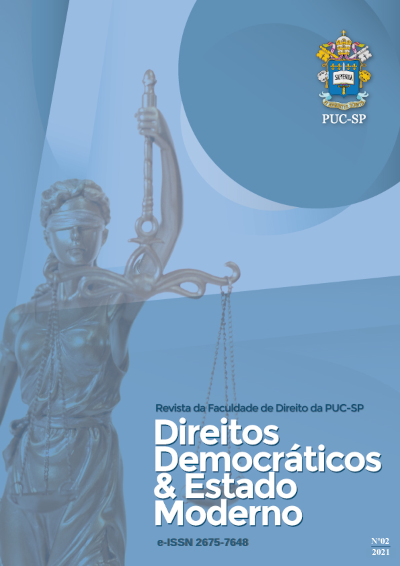A influência dos meios de comunicação na opinião pública no sistema político
DOI:
https://doi.org/10.23925/ddem.v0i2.50544Palavras-chave:
Comunicação de massa, Informações, Opinião pública, PolíticaResumo
Os meios de comunicação de massa, como rádio, jornal, televisão, internet, em um estado democrático de direito, são detentores de poder, porque concentram as informações. Influenciam a opinião privada e pública, porque, do que é veiculado pela mídia por meio da emissão da mensagem, da notícia, da informação, é recebido por aquelas pessoas que estão conectadas a eles. São diversas as informações transmitidas e se aterá àquelas que estão ligadas à política. Assim, o problema que a pesquisa busca responder é: de que maneira os meios de comunicação podem influenciar a opinião pública no sistema político? A investigação utilizará da pesquisa documental e bibliográfica estabelecendo como caminho a exploração dos meios de comunicação no contexto industrial, depois da análise dos meios de comunicação e sua relação com a mídia e, por último, da compreensão do que vem a ser a opinião pública e a interação com o sistema político. O resultado da pesquisa mostra que houve um processo histórico de formação dos meios de comunicação e que a utilização destes pode exercer eficaz influência sobre o sistema político.
Referências
AFFONSO, Annibal. Você está preparado para a quarta revolução industrial? 2017. Disponível em: <https://professorannibal.com.br/2017/05/09/voce-esta-preparado-para-aquarta-revolucao-industrial/>. Acesso em: 21 abr. 2019.
BERCHOLC, Jorge. La opinión pública de los estudiantes de la Universidad de Buenos Aires. Opinión pública y medios de comunicación. Buenos Aires: La Ley, 2003, p.3.
BERCHOLC, Jorge Del diario como foro al diario televisivo: La influencia de la televisión en los diarios. Opinión pública y medios de comunicación. Buenos Aires: La Ley, 2003, p.45.
BERCHOLC, Jorge. Opinión pública y democracia. Buenos Aires: Lajouane, 2015 p.37.
CONGRESSIONAL MANAGEMENT FOUNDATION. Communicating with congress: how capitol hill is coping with the surge in citizen advocacy. 2007. Disponível em: <http://www.congressfoundation.org/storage/documents/ CMF_Pubs/cwc_capitolhillcoping.pdf>. Acesso em: 06 mai. 2019.
FERREIRA, Fernanda Vasques. Raízes históricas do conceito de opinião pública em comunicação. Em Debate, Belo Horizonte, v.7, n.1, p.50-68, jan. 2015.
GENESINI, Silvio. A pós-verdade é uma notícia falsa. Revista USP • São Paulo • n. 116 • p. 45-58 • janeiro/fevereiro/março 2018. Disponível em: https://www.revistas.usp.br/revusp/article/download/146577/140223/. Acesso em: 04 set. 2020.
GOLBECK, Jennifer; GRIMES, Justin; ROGERS, Anthony. Twitter use by U.S. Congress. Journal of the American Society for Information Science and Technology, v. 61, n. 8, p. 1612-1621, 2010.
GROSSI, Giorgio. La opinión pública: teoría del campo demoscópico. Madrid: Centro de Investigaciones Sociológicas, 2007.
GUAZINA, L. O conceito de mídia na comunicação e na ciência política: desafios interdisciplinares. In: Revista Debates, Porto Alegre, v. 1, n. 1, p. 49-64, jul.- dez.2007.
GUO, Yan-Rong; CAO, Qingp Dong; HONG, Zhong-Si; TAN, Yuan-Yang; CHEN, Shou-Dengm; JIN, Hong-Jun; TAN, Kai-Sen; WANG, De-Yun; YAN, Yan. The Origin, Transmission in Clinical Therapies on Coronavirus Disease 2019 (CONVI-19) Outbreak – In Update on the Status. Published online 2020 Mar 13. Disponível em: https://www.ncbi.nlm.nih.gov/pmc/articles/PMC7068984/. Acesso em: 01 abr. 2020.
LIMA, V. A. Mídia: teoria e política. São Paulo: Editora Fundação Perseu Abramo, 2001.
LIMA, V.A. Sete teses sobre a relação mídia e política. Revista USP, São Paulo, n .61, p. 48-57, 2003.
MANIN, Bernard. A democracia do público reconsiderada. Novos estudos CEBRAP, n. 97, p. 115-127, 2013. Disponível em: <http://www.scielo.br/scielo.php?script=sci_arttext&pid=S0101-33002013000300008&lng=en&nrm=iso&tlng=pt>. Acesso em: 06 abr. 2019.
MIGUEL, Luis Felipe. Os meios de comunicação e a prática política. Lua Nova Revista de Cultura e Política, n.55-56, p.155-184, 2002. Disponível em: <http://www.scielo.br/scielo.php?pid=S0102-64452002000100007&script=sci_abstract&tlng=pt> Acesso em: 06 abr. 2019.
MITOZO, I. B. Participação e deliberação em ambiente online: um estudo do Portal e-Democracia. 2013. 105 f. Dissertação (Mestrado em Comunicação) - Universidade Federal do Ceará, Fortaleza, 2013. Disponível em: http://www.repositorio. ufc.br/ri/bitstream/riufc/7895/1/2013-DIS-ibmitozo.pdf. Acesso em: 08 abr. 2019.
RODRIGUES, Malena Rehbein; BARROS, Antonio Teixeira de; BERNARDES, Cristiane Brum. Vozes Sociais na Imprensa: a sociedade no noticiário político. Revista de Ciências Sociais, v. 47, n. 2, p. 16-62, 2016. Disponível em: <http://www.periodicos.ufc.br/revcienso/article/view/6341>. Acesso em: 13 mai. 2019.
SAPERAS, E. Os efeitos cognitivos da comunicação de massas. Lisboa: Edições Asa, 2000.
SCHWAB, Klaus. A quarta revolução industrial. Tradução de Daniel Moreira Miranda. São Paulo: Edipro, 2016.
SCHWAB, Klaus; DAVIS, Nicholas. Aplicando a quarta revolução industrial. Tradução de Daniel Moreira Miranda. São Paulo: Edipro, 2018.
VOLPATTI, Leonardo; LIMA, Fábio Monteiro. A eleição das redes sociais: análise dos principais fatores políticos da eleição de 2018. Disponível em: <http://www.levels.guru/a-eleicao-das-redes-sociais/>. Acesso em: 03 mai. 2019.
Downloads
Publicado
Como Citar
Edição
Seção
Licença
Copyright (c) 2021 Direitos Democráticos & Estado Moderno

Este trabalho está licenciado sob uma licença Creative Commons Attribution 4.0 International License.

Este obra está licenciada com uma Licença Creative Commons Atribuição 4.0 Internacional.
Revista DD&EM - ISSN 2675-7648
















